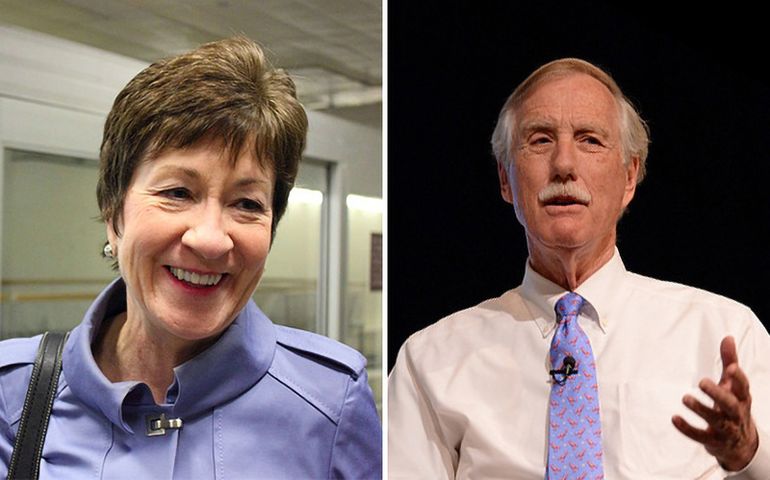Here's what some are saying about Trump's decision to pull out of Paris Climate Agreement
 Foto: COLLINS PHOTO COURTESY / MEDILL DC, FLICKR, KING PHOTO COURTESY / U.S. NAVAL WAR COLLEGE, FLICKR
U.S. Sens. Susan Collins and Angus King both expressed dismay over President Trump's decision, announced on Thursday, to withdraw the United States from the Paris Climate Agreement.
Foto: COLLINS PHOTO COURTESY / MEDILL DC, FLICKR, KING PHOTO COURTESY / U.S. NAVAL WAR COLLEGE, FLICKR
U.S. Sens. Susan Collins and Angus King both expressed dismay over President Trump's decision, announced on Thursday, to withdraw the United States from the Paris Climate Agreement.
In announcing his decision to withdraw the United States from the Paris Climate Agreement, President Trump characterized the accord on Thursday as “simply the latest example of Washington entering into an agreement that disadvantages the United States to the exclusive benefit of other countries, leaving American workers — who I love — and taxpayers to absorb the cost in terms of lost jobs, lower wages, shuttered factories and vastly diminished economic production.”
In his prepared remarks, available on the White House website, the president asserted that compliance with the terms of the agreement would result in 2.7 million lost jobs by 2025, including 440,000 fewer manufacturing jobs. Citing a National Economic Research Associates study, the president said the agreement by 2040 would cut production across numerous industrial sectors, resulting in “$3 trillion in lost GDP and 6.5 million industrial jobs, while households would have $7,000 less income.”
Here’s the breakdown he provided for various sectors: paper down 12%; cement down 23%; iron and steel down 38%; coal down 86%; natural gas down 31%.
His assessment of the benefits of withdrawing from the Paris Climate Accord was not shared by a host of others, including Maine’s two U.S. senators and Maine environmental groups. Maine’s representatives in the House were split on the matter.
What some are saying:
U.S. Sen. Susan Collins, in a tweet: “Climate change requires a global approach. I’m disappointed in the President’s decision to withdraw from the Paris Agreement.”
U.S. Sen. Angus King: “Withdrawing from the Paris Climate Agreement is a mistake of historic proportions, putting our country and, indeed, our entire planet at risk. Climate change is the most serious and pressing global challenge of our time, and it will only be blunted by a coalition of nations working in partnership. This is a short-sighted and irresponsible decision, which future generations will neither forgive nor forget.”
U.S. Rep. Chellie Pingree: “In Maine, we already see the harmful effects of climate change — rapidly rising temperatures are causing higher rates of asthma and tick-borne illness, warming oceans are threatening our economy by causing fish and lobster to migrate, and rising sea levels are jeopardizing coastal communities. Walking away from the Paris Agreement is perilous for America, Maine and the future of our planet.”
U.S. Rep. Bruce Poliquin: “It should be noted that today’s actions are a direct result of President Obama’s failure to seek out and receive full U.S. Senate approval with the full force of a treaty. …. Some large multinational corporations wished for the United States to remain in this agreement so the country could continue to have input on its implementation throughout the world. That is understandable. However as a nation we must also factor in the restrictions on our economy through the Paris Climate Agreement that many American workers, job creators and businesses of all sizes would face in competing with others, including emerging markets. It is critical we have a balance and our nation should continue to strive for a balance on these issues. ... I urge the White House to take a new look at this issue with America’s best interests in mind and in the spirit of working with our world partners on protecting the environment.”
Lisa Pohlmann, executive director, Natural Resources Council of Maine: “This is terrible news for our environment, and it hurts American workers and businesses as we lose economic opportunities to other nations in the global clean energy economy. Here in Maine it would also create big problems for Maine people, businesses, and our environment.”
Daniel Sosland, president of Acadia Center, a nonprofit: "The Northeast region has successfully proven the benefits of pursuing a clean energy, low polluting economy: states have reduced climate pollution while enjoying greater economic growth, job creation and public health benefits. This significant progress on clean energy under both Republican and Democratic leadership at the state and federal level serves as a prime example of what is possible across the nation."
Jules Kortenhorst, CEO of the nonprofit Rocky Mountain Institute: “The energy transition to renewables and energy efficiency will continue unabated. This is evident year after year, both in the U.S. and abroad. In the electricity system, renewable energy and natural gas together produced half of U.S. electricity supplies last year, while coal made up only 30% — the smallest share since officials started keeping track 70 years ago … While jobs in the coal industry won’t come back, those in solar, wind, energy efficiency, and spin-off industries will only grow.”
David Ridenour, president of the National Center for Public Policy Research: "We applaud President Trump for having the courage to withdraw the United States from the Paris climate accord. It was a bad deal for the U.S. worker, a bad deal for U.S. industry, a bad deal for the environment and a bad deal for our system of government.”
Major U.S. companies, with a combined market capitalization of $2.5 trillion, signed a letter to Trump urging continued participation in the agreement. Signers included BP, DuPont, General Mills, Google, Intel, Microsoft, National Grid, Novartis Corp., PG&E, Schneider Electric, Shell, Unilever and Walmart: “By committing all countries to action, the agreement expands markets for innovative clean technologies, generating jobs and economic growth. U.S. companies are well positioned to lead, and lack of U.S. participation could put their access to these growing markets at risk.’’









Comments